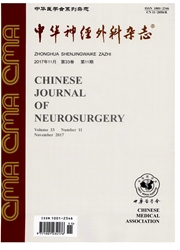

 中文摘要:
中文摘要:
目的报告一个描述颅内动脉瘤弧形瘤颈侵及、占据或涉及(以下称侵及)载瘤动脉圆周情况的新概念——“颈宽角”,并探讨其指导动脉瘤血管内栓塞治疗的意义。方法在载瘤动脉横断面像上,将载瘤动脉壁所构成的图形概括为圆;在此圆上,将动脉瘤瘤颈所侵及的载瘤动脉壁所对应的圆心角定义为颈宽角。回顾近期采用支架内球囊再塑形技术辅助微弹簧圈栓塞治疗的8例宽颈动脉瘤的颈宽角估测结果,结合其影像、栓塞情况,分析颈宽角概念的科学性、必要性、可行性和实用性。结果8例动脉瘤的颈宽角均大于90°,其角度区间为:90°~135°有4例,136°~180°有2例,181°~225°有1例,226°~270°有1例。8例动脉瘤均采用支架内球囊再塑形技术辅助微弹簧圈而成功栓塞,填入的微弹簧圈边缘在瘤颈部呈弧形,相应的载瘤动脉壁被重建,瘤颈部栓塞满意。结论颈宽角概念能够表达颅内动脉瘤,特别是一些无颈或梭形动脉瘤弧形瘤颈侵及载瘤动脉的情况,有助于其血管内治疗方法的选择。
 英文摘要:
英文摘要:
Objective To describe a geometric parameter for delineating the extent to which the parent artery is incorporated by the aneurysm neck, and to investigate the application of this parameter in endovascular treatment of intracranial aneurysm. Method In the 2D cross- section image obtained from the digital subtract angiography which containing simultaneously the aneurysm neck and the parent artery, the vessel lumen boundary of the parent artery is idealized to be a circle and two boundary points were thus determined in this circle where the aneurysm neck incorporating with the parent artery. The central angle formed by these two points and the circle center was defined as the arcuate neck angle, a new geometric parameter. Eight intracranial aneurysms embolized by utilizing the balloon - in - stent technique were reviewed for their measurement results of the arcuate neck angle, as well as their imaging and endovascular therapeutic data. The feasibility and practicability of utilizing this geometric parameter in endovaseular treatment was investigated. Results The arcuate neck angle was more than 90° in all eight aneurysms. The measurement detail was as the following: more than 90° and less than or egual to 135° in four intracranial aneurysms,more than 135° and less than or egual to 180° in two,more than 180° and less than or egual to 225° in one, more than 225~ and less than or egual to 270°in one aneurysm. These aneurysms were all successfully coil embolized. The margin of coil mass at the aneurysm neck appeared to be an arc, where the vessel wall of parent artery was reconstructed, and the aneurysm neck was also satisfactorily occluded for all cases. Conclusions The arcuate neck angle of intracranial aneurysms may approximately represent the extent to which the parent artery is incorporated by the aneurysm neck, especially for some fusiform ones or those without neck. It may benefit the optimization of endovascular therapy for intracranial aneurysms.
 同期刊论文项目
同期刊论文项目
 同项目期刊论文
同项目期刊论文
 期刊信息
期刊信息
